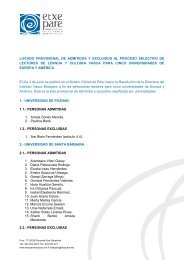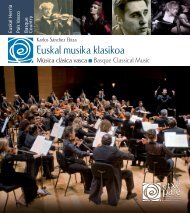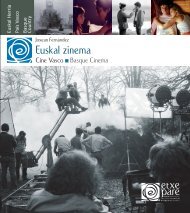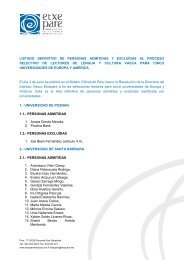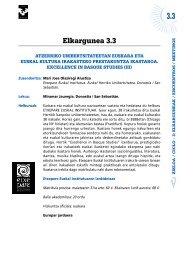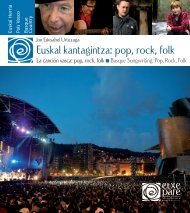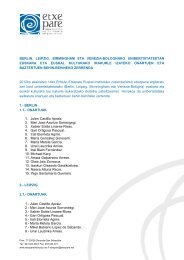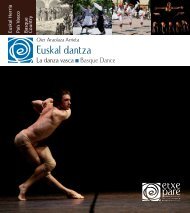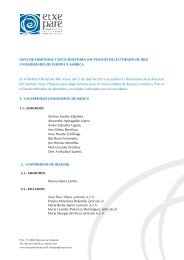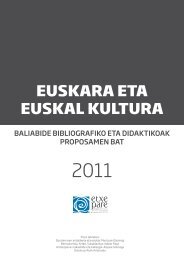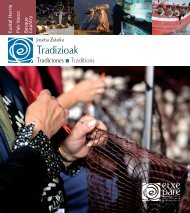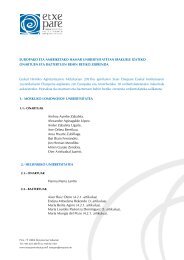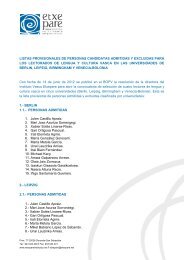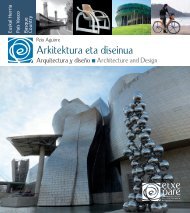Euskal sukaldaritzaz - Etxepare, Euskal Institutua
Euskal sukaldaritzaz - Etxepare, Euskal Institutua
Euskal sukaldaritzaz - Etxepare, Euskal Institutua
Create successful ePaper yourself
Turn your PDF publications into a flip-book with our unique Google optimized e-Paper software.
Fue así como, adecuando lo observado a la nouvelle<br />
cuisine a la propia cultura y al territorio, la nueva<br />
cocina vasca se convirtió en tractor de lo que se ha<br />
llamado nueva cocina española.<br />
La concentración de restaurantes laureados que se<br />
da en Donostia-San Sebastian y sus alrededores, es<br />
difícil de encontrar en cualquier otro lugar del planeta.<br />
El nivel de la alta cocina es tal que el turismo<br />
gastronómico mundial tiene una de sus mecas en<br />
nuestro territorio. He conocido a visitantes franceses,<br />
norteamericanos, canadienses, suecos y de más<br />
lugares –incluso magnates japoneses que han venido<br />
pilotando su propio avión–, llegados para comer en<br />
uno de estos restaurantes y luego marcharse agradecidos<br />
por la experiencia vivida.<br />
Si parece exagerado lo que digo, baste con atisbar<br />
los cinco documentales que me ha tocado en<br />
suerte dirigir recientemente, con cinco de estos<br />
grandes maestros: Juan Mari Arzak, Hilario Arbelaitz,<br />
Andoni Luis Aduriz, Martin Berasategi y Pedro<br />
Subijana. 8<br />
Y son más, muchos más los que ejecutan hoy, con<br />
los pies magníficamente enraizados en la cocina de<br />
siempre, una cocina totalmente nueva que es apreciada,<br />
admirada y reconocida por todo el mundo,<br />
pero sobre todo, por los más grandes cocineros del<br />
planeta.<br />
No es casualidad, que sea Donostia-San Sebastián<br />
el lugar elegido para poner en marcha el Basque<br />
Culinary Center, 9 en la que se ubican la Facultad de<br />
Ciencias Gastronómicas y un Centro de Investigación<br />
e Innovación en Alimentación y Gastronomía. Una<br />
iniciativa privada (Mondragón Unibertsitatea) que<br />
cuenta con ayuda pública de las instituciones y, sobre<br />
todo, de los propios cocineros. Toda una incógnita de<br />
la que permanecemos expectantes.<br />
The concentration of award-winning restaurants in<br />
Donostia and its surroundings is difficult to find anywhere<br />
else in the world. The level of haute cuisine<br />
here is such that our land has become a Mecca for<br />
worldwide gastronomic tourism. I have met visitors<br />
from France, the United States, Canada, Sweden and<br />
elsewhere –including Japanese tycoons who have<br />
flown their own private planes here– who have come<br />
to eat in one of our restaurants, and then leave extremely<br />
happy with the whole experience.<br />
If what I say seems a little far-fetched, just take a<br />
look at one of the five documentaries I have been<br />
lucky enough to direct recently, with five of these<br />
great maestros: Juan Mari Arzak, Hilario Arbelaitz,<br />
Andoni Luis Aduriz, Martin Berasategi and Pedro<br />
Subijana. 8<br />
And there are many, many more carrying out today,<br />
with their feet firmly on the ground of traditional<br />
cuisine, a completely new cuisine that is treasured,<br />
admired and recognized all over the world, but especially<br />
by the great world chefs.<br />
It is no coincidence that Donostia was the place chosen<br />
to set up the Basque Culinary Center, 9 housing<br />
the Faculty of Gastronomic Sciences and a Centre for<br />
Research and Innovation in Food and Gastronomy.<br />
This is a private initiative on behalf of Mondragon<br />
Unibertsitatea that also enjoys public institutional aid<br />
and, especially, the chefs themselves. An unknown<br />
venture but one that we are very hopeful about.<br />
27



